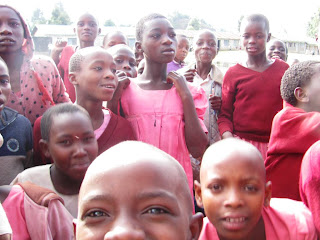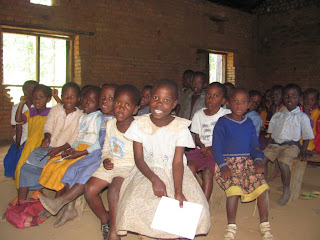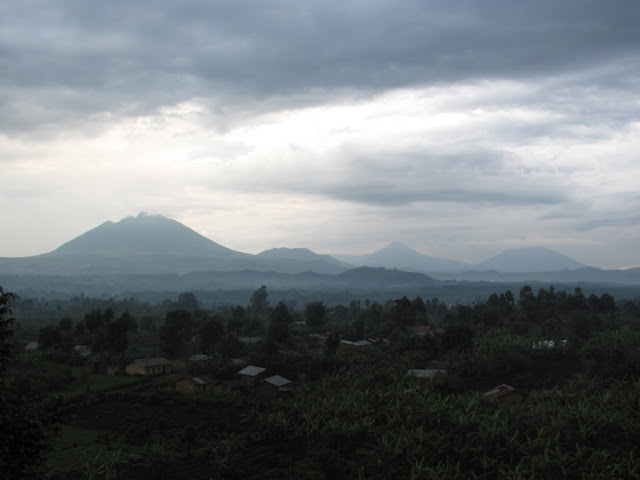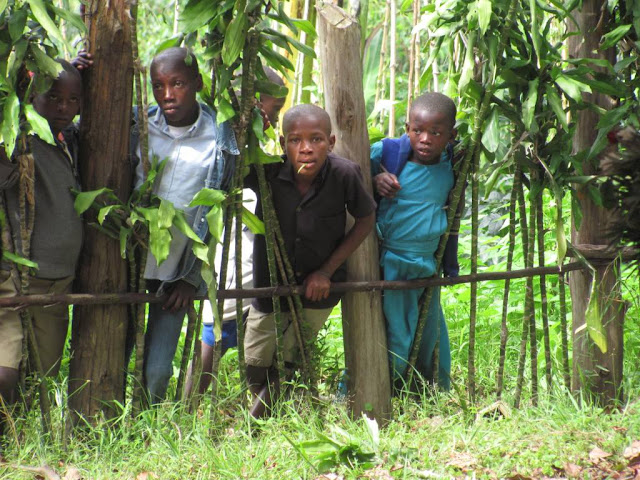 |
| Christine working hard on her letters. |
Today I took Christine to the eye Doctor. We arrived around
9:20 to a crowd of waiting patients. Many of them were waiting in front of
other doors, the door labeled "Eye Clinic" only had about ten people
outside of it. We sat down and waited for the Dr. to arrive, whatever time that
might be. Another muzungu shows up with an albino girl, they took the liberty
of standing directly in front of the door to ensure they'd be the first
patients seen. We watch as an old man is carried in by two younger men, a child
limps in on an injured ankle and a woman carries her screaming baby back and
forth as she waits for her turn to be seen. By 10:00 we were called in, when
the Dr. saw me, she beckoned us in. I felt funny jumping in front of everyone
else, but when the Dr. calls, you go! The Doctor asked us what exactly the
problem was. I explained that when she's reading it seems like she can't see
the words and she acts as if my finger is in the way, even though it's not. She
had her stand on the line on the floor and asked her to cover her left eye.
Christine recited the first line perfectly, the second line she was stuck on
the first letter, the letter was "N". I suggested she go to the next
letter, which was "Z" since we know she knows that letter from the
first line. She proceeded all the way down the chart. She called the letter
"P" a "B" each and every time. She didn't know the letter
"F" each time she came to it, otherwise she did perfectly all the way
down to the very last row, which was too small for her or I to see. When she
switched to the other eye, she stumbled on the same letters. The Dr. asked me
if she was "stable", I said, "yes, I think so." Then I asked
her why she asked. She explained that she's seeing "strange behavior"
in her. "Like what?" I ask.
She tells me that when she asks her why she can't read those letters that she
stumbles on Christine tells her that she "forgot" them. I ask the
Doctor if she knows of dyslexia? She's says, "that's a new one to
me". I explain that sometimes the eyes turn things around and that people
actually see things backwards or even upside down. She continues on with the
exam, forcefully telling Christine, "help me to help you", as she
pushes her hand over her eye for her as Christine tries to cheat and peek out
from under the hand. Next she uses a light and shines it in her eyes, then she
asks me if she can read the blackboard. I tell her I don't know and I
explain that when we read books is when I see her struggling and noticed the
problem. She again mentions that she doesn't seem stable and she tells me to
come back on Friday and to bring her mother with us. Since her mother knows her
and her behavior, she thinks she can get a better sense of the situation.
"But what did you conclude from the exam?" I ask. "What did you
see in her eyes with the light?" She tells me everything looks fine but
now they are going to the theater (the operating room) and that I should come back
on Friday, when they can do some testing for "refraction". She is not
giving any treatment at this point and she scribbles something on the notebook
paper that I scratched Christine's name and age on while waiting outside. I
noticed everyone else holding a paper and asked about it, the man next to me
instructed me to write her name, age and her school. I handed the Dr. the piece
of notebook paper when we walked in. This paper is the record of the visit.
There are no hospital records and if the Dr. gives a prescription or
instructions it is written on this paper and is the patients responsibility to
retain.
Much to my surprise Christine and I leave the hospital by 10:30. We walk to
town, I have to go to the post office to pick up a package. I stopped this
morning, the doors were open and I saw a package with my name on it sitting on
the counter. I yelled and yelled, "Hello? Hello!" but no one was
there. When I stopped Tuesday morning around 10 a.m. the doors to the post
office were locked. I asked the man shining shoes outside why the post office
was closed today, and he shrugged. Some things have no explanations or reasons,
they just are. Christine walks like a turtle, like most Africans do. Nothing
but time, and there's no such thing as a hurry. I notice she is wearing shoes
that are about 3 sizes too big for her. They are plastic slip-ons, similar to
the jelly shoes we used to wear when I was a kid. The backs are cut off of them
so they are more like a slipper hanging on her feet that drag with each step.
Yesterday
the director and I walked to her home to tell her mother that I wanted to take
her to the eye Dr. her mother wasn't home, we just found Christine and a
handful of young kids hanging around. The home is one room, it is made of poles, then filled in with mud. Director Alex explained to
me that this family was very poor, I had no idea just how poor. The mother and
five children live in this one room mud house. It is decent sized, but there is
nothing inside of it. They sleep on grass mats, covered with thin sheets. The
mother's only job is "digging", also known as a peasant, or a person
who grows crops on their land. This is the only
income for this family of six. The father "ran off".
 |
| Christine in front of her home. |
We leisurely stroll into town, when we arrive at the post office the doors are
closed again. I really want that package TODAY. It is the pen pal letters from
my cousin in Minnesota and today is the last day of school before students all
over Uganda go on a three week break before the next term starts. If they don't
reply to the letters and send them back before their break the students back in
MN won't receive them until mid-May and then, of course, they'll be going on
summer vacation. We walk down the street and I see a dress hanging in a shop. I
ask to see it and hold it up to Christine. She's wearing a torn and tattered
skirt, with the orange button-up shirt of her school uniform. There's one dress
that fits her perfectly, there's another that's too big, she really likes the
big one. I rationalize that she won't grow out of it too quickly and I buy it
for her. We also buy a 1/2 kilo of sugar, soap for washing clothes, bread and a
backpack to put it all in. I pick the pink and gray backpack up and she seems
indifferent about it. Then she sees the spider-man one behind it and her face
lights up. I spend the $4. and we pack all her goodies into her bag. Her
English is very limited, she's spent the morning speaking to me in broken/mixed
languages. She starts in English, "He says you wantua mwabi ingisoro." I laugh and say, "English
Christine. What is wantua mwabi ingisor?" She says, "yes!" So we
mostly walk in silence. Now she's getting the hang of this shopping spree as
she points to a pair of black dress shoes and says "Muzungu, socks!"
I ask her if she wants shoes and socks. She smiles as we walk into the shop. I
pick a pair of green canvas sneakers, but she is adamant about the black dress
shoes. She tries them on, discreetly slipping her foot out of her plastic
sandal and sliding it quickly into the dress shoe. When I press on the toe to
see how roomy they are I notice her cringe a little. She insists that they fit
and they feel fine. She quickly takes them off, slips her sandals back on and
slides them into her backpack, all before I have even asked how much they are.
The man tells me 30,000 Shillings, which is about $12. I’m sure it’s way too
much so I try to talk him down but he holds firm. I get him down to 28,000. I
know I can’t possibly tell Christine to take them out of her bag now. I’m also
sure she’s never owned a real pair of shoes before. I mean a closed-toe pair, that aren’t plastic. So I pay him the $11. and
we go. She spots a man pushing a bicycle with a giant rack on the back of it.
He is selling everything under the sun, including handkerchiefs, sunglasses,
watches, hats, photo albums and most importantly…socks. We find a pair of white
dress socks and she is happy.
 |
| The bicycle with a shop on top, where we bought Christine's socks. |
We walk back to the post office and she’s trying
to tell me something about her hair. I tell her we’re “finished” shopping and she stops
talking about it. I’m not certain, but I think she’s asking me for some hair
extensions. People spend a lot of money, that they don't have, on their hair here.. An African’s hair is very hard and course, so if you don’t want
short, buzzed off hair you usually have a “weave” or “extensions” attatched to
your head. As we walk up to the post office I see the doors are open, I walk
quickly ahead of her, excited to see if Henry is really there. She comes in
after me as I stand and wait for Henry to gather the paperwork that I need to
sign. There are about four different forms I need to fill out to pick up the
package. Christine sits next to me on the bench as we wait and I ask to see her
feet. She doesn’t understand me, or she pretends not to as I point at her foot.
She reluctantly lets me slip her shoe off and I am not prepared for what I see.
The ends of her toes look as if they have been through a blender. I had never
smelled the odor of rotting flesh before. It is a shocking and putrid assault
to my senses. I put her shoe back on and ask her if it is painful. She again
doesn’t understand me. I ask her if it’s “paining” and she seems confused and
embarrassed about the situation. I stand up and finish my business with Henry
with tears in my eyes. We carry the package out of the "posta" and
head directly to the pharmacy. When I tell Christine to take off her shoe
again, she looks at me with daggers. I know she’s embarrassed about it, but I
also know we need to do something about her feet or she may not be walking by
the time she turns eleven. The Pharmacist takes a look at her feet then calls
for her supervisor. They send us back down the street and tell us what we need
is found at the farm supply store. I ask her what the damage is from and she
tells me "jiggers". I think of the two I had in my toes and how
unpleasant it was to remove them. I wonder how many Christine must have had
embedded in her toes and I also wonder who digs them out for her. We slowly
make our way back the way we just came to the farm supply store. I explain that
we need something for jiggers. He grabs a small bottle and tells me to dilute
it with water. It clearly states on the bottle not to let it come in contact
with the skin. I ask where we put it and he explains it's for the ground, the
floor of the house. Then he decides we need a bigger bottle. I'm sure
Christine's mother can't read so I make sure he explains to her how it is to be
used. He also writes the directions in the local language for her older
brother. I try to ask how long it will last, how often it needs to be done, but
the man doesn't seem to understand my question. As we leave I wonder if they'll
actually use it, if they'll actually get the three liters of water and mix the
solution to de-jigger their home.
We head back to school, her backpack is stuffed with goodies, including bread
and avocados we put in on top. As we approach school I tell her
"sshhhhhhh" don't tell. I can picture every kid in school,
"Muzungu, give me shoes, give me bread....!" I explain to the director that we need to go back to the Dr. on Friday and he
tells Christine to be at school at 9:00 on Friday morning with her
mother. I spend the rest of the day in the 6th grade classroom. I hand
out their pen pal letters, they are ecstatic. Not only did they get responses
from their friends in America, but each letter had a photo of their new friend
stapled to it. They thought that was incredible and the box was FULL of colored
pencils, crayons and glue. I had to explain what pizza is, what wrestling is
and what squirrels are! They colored and wrote for the next couple of hours.
When they still weren't finished by the time 5:00 came and I wanted to leave I
promised to collect the papers in the morning and get them in the mail the
following day, which would be their last day of school for three weeks. The
place was a mad house with excitement. When I asked the students what they were
going to do on their holiday, every single students answer was the same.
"Help my parents with domestic work." "Like what?" I asked,
"what kind of domestic work?" Every student, no matter the age is
going to spend the next three weeks digging in the garden, weeding the garden,
cooking, washing clothes and visiting their friends, grandparents or relatives.
I ask them if they'll also be relaxing, they laugh and tell me yes, but I’m not
sure when they’ll squeeze that it.
On Friday, when I show up at school to meet Christine, I am not surprised to
find that no one is there. The gate is closed and I have to squeeze through the
gap, I find two third graders inside. I ask them what they are doing and they
tell me they are looking for the director to get their "holiday
package". Their holiday package is schoolwork for them to do while on
holiday. I give them each a samosa and I squeeze back out through the gate and
head to Christine's home. She is sitting outside with five little kids when I
arrive. As soon as she sees me, she gets up and heads to her house. She goes in
and changes into her new dress while I wait outside. Her brother comes out, I
ask if they got the soap and sugar and he says, "soap". Something
about him seems really strange to me. I give him and another little boy there
the last two samosas from my backpack. The little one gobbles his up while
Bosco, the older brother doesn't seem very interested in it. He casually walks
around me and takes the sunscreen out of the side-pouch of my backpack, he
opens it, then puts it back. Christine comes out, the straps on her dress are
tied in knots to keep it up over her chest. She has the socks on and the
plastic shoes. I'm not surprised; with the condition of her toes I'll be
surprised if she ever wears the dress shoes. We start to leave, her brother
drops the samosa and she picks it up for him. Something about him isn't quite
right. My mind goes wild with different horrific scenarios of what could be
happening in that little mud house.
 |
| Christine, in her new dress and her brother outside their home. |
This time it's a different eye Doctor. He is a little friendlier than the last
one and seems generally interested and concerned about Christine. Today she
identifies the "P"' perfectly, but she cannot identify the
"H" or the "R". We agree it's odd and he continues the
exam, he conducts the same exam that the woman did a few days earlier, he also
does a few more tests. In the end he tells me, "she says she doesn't have
a problem and her eyes look beautiful on the inside." I say, "that's
great!" Then I ask what he thinks the problem is? He says she just doesn't
know certain letters. I tell him the little bit that I know about her home life
and we discuss that while Christine fiddles with the strings on her dress. I
wonder again about the brother, about her home life. Teacher Chantel told me
that Christine is the only girl in the house, so she's responsible for all of
the cooking and the washing. At ten years old, she is cooking, cleaning, and
gathering firewood, fetching water, all of it, for a family of six. I wonder
how hard it would be to concentrate on school, with all those responsibilities,
when you are hungry or possibly abused or have a multitude of other things
going on in your life.
Christine has very good vision. That's a good thing. Though, now I don't know
what to do. It was supposed to be an easy fix. She gets glasses and suddenly
she can read and is a star student. We head back to her home with bananas,
bread and avocados. We sit under a big tree in her yard and I write the letters
out in a notebook. She copies, a whole page of capital letter "A" and
small letter "a". I sit with her through the letter "D" to
make sure she understands to fill the whole page. I try to explain slowly that
her eyes are very good, she needs to work very hard at school to learn her
letters and to learn to read so she can pass her exams. I know that her mother
will not keep coming up with school fees for her if she has to repeat P3 over
and over again. It is very common for kids to repeat grades here. It was
confusing at first, walking into the first grade glass with students almost as
tall as I am standing next to six year olds. I also know that if this girl drops
out of school at age ten, there is no future for her. She will be living in
this very mud home, digging jiggers out of her feet for the rest of her
life.
 |
| Reading and Writing with Christine under the big tree in her yard. |
|
The rest of the week, I drop in on Christine. Each time she
is happy to see me and comes running up to hug me when she seems me coming up
the trail. Finally on my fifth visit I meet her mother, of course she doesn't
speak English, so we greet each other and ask over and over how each other are,
then I carry on my visit with Christine. I read with her, work on her alphabet
and try to imagine what is going on in her mind as we sit and repeat the words
over and over and over, all the while hoping something will "click"
and she'll get it. As I was leaving her brother brought me an empty package of
malaria medicine and with his broken English asked me to buy him more. "My
head is paining!" he said. After we finished reading Christine and I were
leaving to go to the pharmacy and the brother, along with the eight
neighborhood kids that had gathered and read the books with us, follow us down
the path to the road. He says, "next time you come, I want a
bicycle." What do I look like Santa Clause?! I look at him and tell him,
"the medicine, yes. the bicycle, no." When we got to town, we use the
Pharmacist as a translator and I tell Christine I'm leaving and I'll be back in
June. Her response, "I want my head shaved!" All this time she's been
trying to tell me something about her hair and I assumed she wanted me to buy
her hair extensions! We went across the street and got her head shaved for
forty cents.
Today, a month later, I’m working with ten third graders. Christine
and two other boys are the ones who struggle the most. Bruno and Enoch are as
far behind, or more, as Christine. Bruno can recite his alphabet, if he starts
at the beginning. He cannot identify or write a single letter on his own. When he’s stuck, it is Christine who helps
him. I smile at her proudly when she tells him what the next letter is. She can’t
for the life of her, remember the letter “G”, otherwise she can say, write and
identify the entire alphabet. Teacher Chantel tells me that she sees a change
in Christine, she seems happier and she is picking up more things in class. I
can only hope it is true. Christine’s mother has agreed to let Christine be a
boarder at school. That means Christine can concentrate on school Monday thru
Friday, then go home on the week-end and help her mother with the domestic
work. I have agreed to buy her a mattress, sheets, blanket, soap and a basin
for bathing. Those are all the things that are required to be a boarder at
school.
Christine has a long, hard road ahead of her, she has a lot of catching up to do, but she is
capable. Another valuable lesson I've learned here; life isn't fair and it
isn't easy. The progress I see already is encouraging. Once she becomes a boarder
I believe she will soar!







































